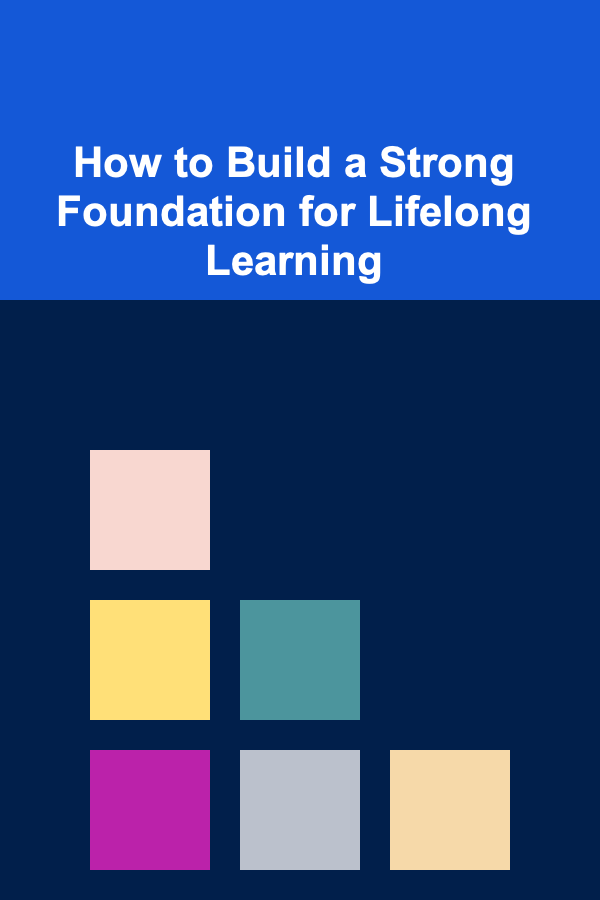
How to Build a Strong Foundation for Lifelong Learning
ebook include PDF & Audio bundle (Micro Guide)
$12.99$7.99
Limited Time Offer! Order within the next:

Lifelong learning is more than just a buzzword---it's a philosophy, a mindset, and a commitment that can transform not only the individual but society as a whole. In an era defined by rapid technological advancements, global interconnectedness, and constant change, the ability to learn continuously is more important than ever. Whether you are a student, a working professional, or someone navigating personal growth, developing a solid foundation for lifelong learning can help you stay relevant, adaptable, and fulfilled.
In this article, we will explore the principles and strategies for building a strong foundation for lifelong learning. We will examine the necessary skills, habits, and mindset shifts required to engage in continuous education, discuss the role of technology and resources, and look at how learning can be tailored to an individual's needs and goals.
Understanding Lifelong Learning
Lifelong learning is the practice of constantly developing new skills and knowledge throughout an individual's life. It involves both formal and informal education, spanning everything from traditional classrooms to self-guided learning at home or through online platforms.
In a broader sense, lifelong learning is not just about accumulating facts or mastering specific disciplines. It's about fostering a growth-oriented mindset and the ability to learn new things---whether they are related to work, personal interests, or societal issues.
Why Is Lifelong Learning Important?
The world is changing at a rate never seen before, especially with the rapid pace of technological innovations. Automation, artificial intelligence, and other advancements are transforming industries, jobs, and skills requirements. In this environment, the need to constantly adapt and acquire new skills becomes paramount.
Lifelong learning also helps in:
- Adaptability: Being able to adjust to new circumstances, technologies, and ways of thinking.
- Problem-Solving: As the world becomes more complex, the ability to find creative and effective solutions to new challenges is increasingly important.
- Career Growth: Continuous learning helps professionals stay competitive in their fields, develop new expertise, and remain relevant.
- Personal Fulfillment: Lifelong learning can lead to a more enriched and fulfilling life by providing opportunities for personal growth, self-discovery, and creative expression.
The Mindset of a Lifelong Learner
Building a strong foundation for lifelong learning begins with cultivating the right mindset. The way you approach learning will significantly impact how successful you are in the long term.
1. Adopt a Growth Mindset
A growth mindset, coined by psychologist Carol Dweck, is the belief that abilities and intelligence can be developed with effort, learning, and persistence. People with a growth mindset are more likely to embrace challenges, learn from failure, and view learning as a continual process. This mindset contrasts with a fixed mindset, where individuals believe their abilities are predetermined and unchangeable.
To foster a growth mindset:
- Embrace Challenges: See challenges as opportunities to grow rather than obstacles to avoid.
- Learn from Failure: Mistakes and setbacks are part of the learning process. Rather than feeling defeated, reflect on what went wrong and use that knowledge to improve.
- Celebrate Effort: Value effort and perseverance over immediate results or natural talent. Recognize that hard work leads to improvement over time.
2. Develop Curiosity
Curiosity is the driving force behind lifelong learning. When you are curious, you naturally seek to explore new ideas, ask questions, and seek answers. Curiosity pushes you to go beyond surface-level understanding and dive deeper into subjects that interest you.
To cultivate curiosity:
- Ask Questions: Don't be afraid to ask "why" or "how." Develop the habit of questioning assumptions and seeking a deeper understanding of the world around you.
- Engage with Diverse Topics: Broaden your scope of interest by exploring new subjects. Read books, attend talks, or join discussions on topics that are outside your usual sphere of interest.
- Embrace the Unknown: Sometimes, curiosity leads to uncertainty. Instead of shying away from it, embrace the unknown as an opportunity to learn and discover.
3. Be Open to Feedback
Feedback is a powerful tool for improvement, yet many people shy away from it because it can be uncomfortable. However, embracing constructive feedback allows you to grow and refine your knowledge and skills. It can come from a teacher, colleague, mentor, or even self-reflection.
To be more open to feedback:
- Seek Feedback Regularly: Ask for input from others and actively seek areas where you can improve.
- Be Receptive: Approach feedback with a positive attitude, focusing on how it can help you grow rather than taking it personally.
- Reflect on the Feedback: After receiving feedback, take time to reflect on it. What can you learn from it? How can you apply it to improve?
4. Persistence and Patience
Lifelong learning is not always a smooth or quick journey. There will be times when progress is slow, and you may face setbacks. Persistence is key in overcoming these challenges. Developing patience with yourself is equally important---learning takes time, and mastery is a gradual process.
To build persistence and patience:
- Set Realistic Goals: Break down larger goals into smaller, manageable tasks. This helps maintain motivation and makes the learning process feel more achievable.
- Celebrate Small Wins: Acknowledge and celebrate small milestones along the way. This can boost morale and keep you motivated.
- Be Patient with Yourself: Understand that expertise and mastery take time. Be patient and kind to yourself during the process.
Effective Strategies for Lifelong Learning
Once you've established the right mindset, the next step is to implement strategies that facilitate ongoing learning. These strategies can be applied to various areas of life, including career development, personal growth, and academic pursuits.
1. Set Clear Learning Goals
To make progress in lifelong learning, it's important to have clear, specific, and achievable goals. These goals provide direction and help you stay focused.
To set effective learning goals:
- Be Specific: Instead of vague goals like "learn a new language," set specific objectives such as "learn 500 new vocabulary words in three months."
- Measure Progress: Break your goals into smaller tasks that can be tracked over time.
- Set Deadlines: Time frames help create a sense of urgency and make it easier to plan your learning activities.
2. Create a Learning Plan
A learning plan outlines the steps you need to take to achieve your learning goals. This plan serves as a roadmap to ensure that you stay on track and make consistent progress.
To create a learning plan:
- Identify Resources: Determine the resources you need, such as books, courses, or mentorship.
- Schedule Time: Dedicate regular time slots for learning. Whether it's a few hours a week or 30 minutes a day, consistency is key.
- Track Progress: Use tools like journals or apps to track your progress and reflect on what you've learned.
3. Leverage Technology and Online Learning
Technology has revolutionized how we access knowledge. Online courses, podcasts, educational videos, and digital textbooks have made learning more accessible than ever. With platforms like Coursera, edX, LinkedIn Learning, and others, you can learn virtually anything at your own pace.
To make the most of online learning:
- Take Online Courses: Enroll in courses that align with your interests or career goals. Many platforms offer free or affordable courses on a wide variety of subjects.
- Utilize Learning Apps: Download apps that help with language learning, coding, productivity, or other skills.
- Join Online Communities: Participate in online forums or groups related to your interests. These communities can provide support, resources, and accountability.
4. Read Regularly
Reading is one of the most effective ways to learn. Books, articles, research papers, and blogs provide new insights, theories, and ideas. Make reading a regular part of your daily routine.
To read effectively:
- Diversify Your Reading Material: Read across genres and topics. Mix fiction and non-fiction, technical books and creative works, classic literature, and contemporary texts.
- Take Notes: Jot down key points or thoughts while reading to reinforce your understanding and make it easier to review later.
- Join Book Clubs or Reading Groups: Engage in discussions with others about what you read. This can provide new perspectives and deepen your understanding.
5. Practice Active Learning
Active learning involves engaging with the material actively, rather than passively absorbing information. This could include activities such as taking notes, discussing ideas with others, applying knowledge to real-world situations, or teaching what you've learned to someone else.
To engage in active learning:
- Teach Others: Teaching is one of the most effective ways to solidify your understanding. Share your knowledge with peers or mentor someone who is learning the same material.
- Discuss What You Learn: Join study groups or forums where you can discuss concepts and ask questions.
- Apply Knowledge Practically: Put what you learn into practice, whether it's through projects, experiments, or practical exercises.
Overcoming Common Barriers to Lifelong Learning
While the benefits of lifelong learning are clear, there are several obstacles that can hinder your progress. Identifying these barriers and developing strategies to overcome them is an essential part of building a sustainable learning practice.
1. Lack of Time
Time is one of the most common challenges to continuous learning. Balancing work, family, and other responsibilities can make it difficult to dedicate time to learning.
To overcome this:
- Make Learning a Priority: Set aside specific time blocks each week for learning, just like you would for exercise or other important tasks.
- Use Microlearning: Engage in short, focused learning sessions. Even 10-15 minutes a day can add up over time.
- Learn in the Margins: Take advantage of small gaps in your day (commuting, waiting in line, etc.) to listen to podcasts, read articles, or review flashcards.
2. Procrastination
Procrastination can prevent you from making progress in your learning journey.
To combat procrastination:
- Start Small: Break down tasks into manageable steps and focus on starting rather than finishing. Often, just beginning a task can overcome the inertia.
- Use the Pomodoro Technique: Work in short bursts (25 minutes) followed by short breaks. This technique increases focus and productivity.
- Eliminate Distractions: Create a dedicated study or learning space where distractions are minimized.
3. Lack of Motivation
Sometimes, motivation can wane, especially when the learning process feels slow or difficult.
To stay motivated:
- Set Meaningful Goals: Make sure your learning goals align with your personal or professional aspirations.
- Celebrate Achievements: Reward yourself when you reach milestones to maintain motivation.
- Find Accountability: Share your goals with a friend or join a learning group to create a sense of accountability.
Conclusion
Building a strong foundation for lifelong learning requires a combination of the right mindset, effective strategies, and a commitment to continuous personal and professional growth. By adopting a growth mindset, cultivating curiosity, and using the right resources and tools, you can stay adaptable, resilient, and engaged throughout your life. Lifelong learning is not just about acquiring knowledge---it's about embracing change, staying relevant, and fostering a fulfilling and dynamic life.
In a world that is constantly evolving, the ability to learn and grow will continue to be one of the most valuable assets you can possess. By making lifelong learning a central part of your life, you can navigate the complexities of the modern world with confidence, creativity, and purpose.

How to Create a DIY Home Bar for Your Next Party
Read More
How to Design SMS Campaigns That Respect Customer Preferences and Improve Cart Recovery
Read More
How to Keep Your Home Party Budget-Friendly Without Compromising Fun
Read More
How to Organize a Family Talent Show Night at Home
Read More
How to Participate in Marine Conservation Efforts: A Comprehensive Guide
Read More
How to Budget for Baby's First Year Milestones
Read MoreOther Products

How to Create a DIY Home Bar for Your Next Party
Read More
How to Design SMS Campaigns That Respect Customer Preferences and Improve Cart Recovery
Read More
How to Keep Your Home Party Budget-Friendly Without Compromising Fun
Read More
How to Organize a Family Talent Show Night at Home
Read More
How to Participate in Marine Conservation Efforts: A Comprehensive Guide
Read More